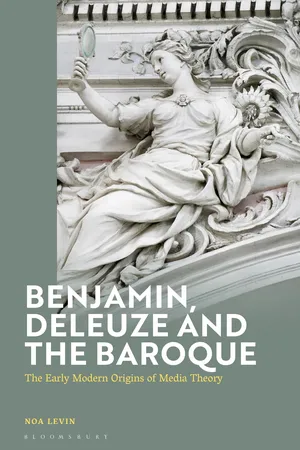
- English
- ePUB (mobile friendly)
- Available on iOS & Android
About this book
For Walter Benjamin and Gilles Deleuze, who both authored seminal theoretical works on early cinema and photography, the history of modern media begins much earlier, in Baroque culture and science. Benjamin, Deleuze and the Baroque argues that their media theories were informed by their respective readings of the philosophy and mathematics of G.W. Leibniz, and the Baroque can thus be seen as the locus of modern media.
By critically comparing Benjamin and Deleuze's interpretations of the Baroque, Levin demonstrates the extent to which their theories of visual culture are intertwined with critiques of Enlightenment historiography and politics. Using a hermeneutic comparative approach, this book argues that the juxtaposition of Benjamin's reception of Leibniz with Deleuze's highlights the extent to which both authors' theories of image and media were informed by Leibniz's concepts of expression and perspectivism, themselves inspired by ground-breaking evolutions in optics and perspective. Providing close readings of Deleuze's The Fold and Benjamin's Origin of the German Trauerspiel, which remain understudied in the English language, it explores how, in their dual roles of philosopher and cultural critic, the pair may illuminate our own age of multiple crises through the Baroque.
Frequently asked questions
- Essential is ideal for learners and professionals who enjoy exploring a wide range of subjects. Access the Essential Library with 800,000+ trusted titles and best-sellers across business, personal growth, and the humanities. Includes unlimited reading time and Standard Read Aloud voice.
- Complete: Perfect for advanced learners and researchers needing full, unrestricted access. Unlock 1.4M+ books across hundreds of subjects, including academic and specialized titles. The Complete Plan also includes advanced features like Premium Read Aloud and Research Assistant.
Please note we cannot support devices running on iOS 13 and Android 7 or earlier. Learn more about using the app.
Information
Table of contents
- Cover
- Halftitle Page
- Dedication Page
- Title Page
- Contents
- Introduction
- 1 Of monads and mirrors: Leibniz’s monad in Deleuze and Benjamin
- 2 Infinite tasks of learning: The Baroque-inspired epistemologies of Benjamin and Deleuze
- 3 Spectres of eternal return: Baroque forces in Benjamin’s theory of historical experience
- 4 It’s all about perspective: The body politics of the Baroque image
- 5 From the crystal palace to cinematic crystals: Baroque optics as pre-cinematic form
- Conclusion
- Notes
- Bibliography
- Acknowledgements
- Index
- Imprint